#plural support
Explore tagged Tumblr posts
Text
Welcome to Healthy Multiplicity
A Tumblr community dedicated to embracing and celebrating all forms of plurality. Whether you identify as traumagenic, endogenic, or anywhere in between, you are welcome here. Our community is a space for sharing experiences, learning from one another, and exploring what it means to live a healthy, fulfilling life as plurals.
Our Inner Family
We are the Reflection Family, a polyfragmented DID collective with over 200 members across eight distinct systems sharing one body. Our collective includes a diverse range of parts, each with unique identities, roles, and contributions to our shared existence. We’ve found that integrating as a team—working together, building communication, and nurturing strong inner relationships—is key to navigating our complex plural experience.
Our Beliefs and Mission
At Healthy Multiplicity, we believe that everyone has parts—different facets of their personality that play various roles throughout their lives. Embracing this belief, our mission is to encourage the acceptance and acknowledgment of these inner selves as a vital path to healing and personal growth. We see this approach as the future of psychology, where understanding and integrating our inner selves can lead to profound healing and self-awareness.
We encourage all members, whether plural or singular, to explore their inner worlds, embrace their parts, and foster a deeper understanding of themselves and their relationships. This community is dedicated to supporting one another on this journey, sharing insights, and exploring the possibilities that come with accepting and celebrating all aspects of who we are.
Join Us
We invite you to join Healthy Multiplicity and be a part of a community where every experience and perspective is respected and valued. Whether you’re well-versed in navigating plural life or are just beginning to explore your multiplicity or inner selves, there is a place for you here. Together, let’s create a space where every part can feel seen, heard, and celebrated.
#plural support#plural stuff#plural system#plural community#osddid#did support#inner world#pro endogenic
7 notes
·
View notes
Text
To the wonderful plural folks / systems struggling out there right now-
It'll be okay.
You guys are not alone in this fight, whatever that fight may be.
If you ever need someone to talk to, we'll be here.
♡ Jackson and Michael (he/him)
#need some therapy from two dads? weve got you.#jackson and michael posting#system positivity#plural positivity#plural support#system support#plural blog#endo safe#udd system#plural gang
0 notes
Text
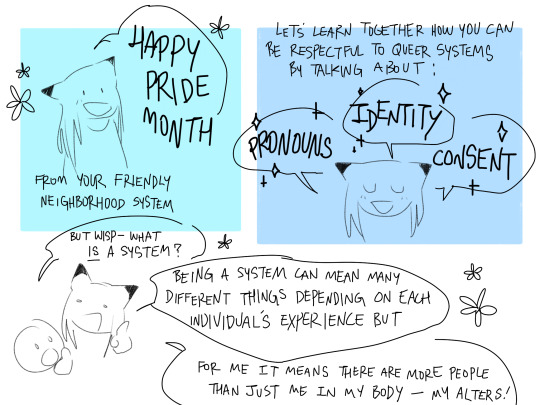
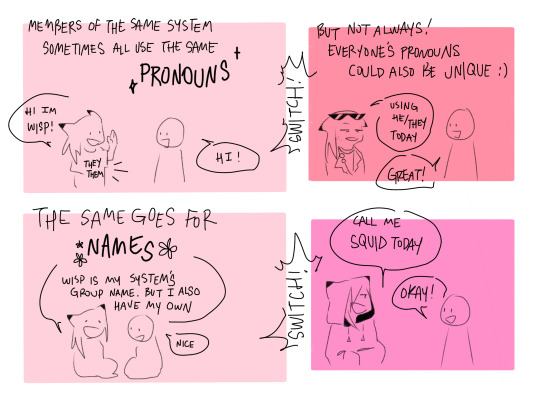
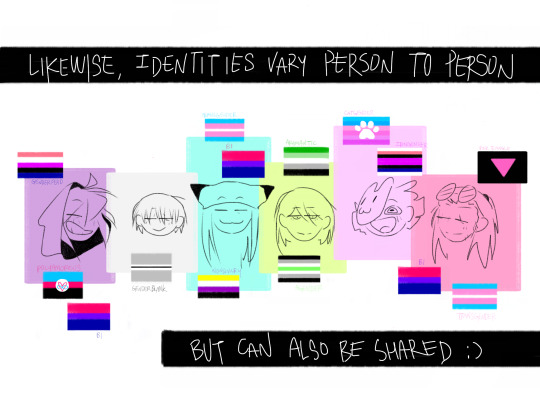

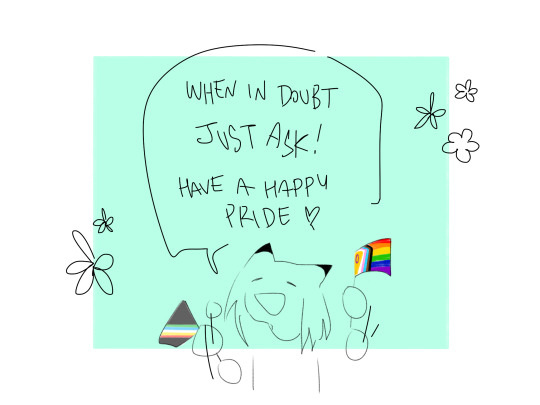
happy pride, everybody. ask me about my queer system
[Edit: now has image description]
#this is wisp#system posting#dissociative identity disorder#DID#other specified dissociative disorder#OSDD#plurality#multiplicity#actually dissociative#actually plural#system pride#happy pride month#myart#happy pride#disability pride#pride month#endo safe#we support all systems here#pro endo#pro whatever else
2K notes
·
View notes
Text
Calling alters "alters, parts, headmates, peices": 🚫🚫🚫🚫
Calling alters: "those bitchass motherfuckers" ✅️✅️✅️
#systempunk#syspunk#did system#system community#did community#system stuff#did posting#did positivity#did osdd#traumagenic did#did alter#actually did#pluralpunk#plural system#plural community#actually plural#plurality#pluralgang#system support#system things#actually a system#system blog#traumagenic system#system positivity#system posting#endos fuck off#endos are ableist#fuck endos#endos not for you#dissociative identity disorder
1K notes
·
View notes
Text
Plural Systems! This is a comic for my plural friends and i hope it helps any singlets reading understand a little more about them ^^ for the record I'm not plural, im not an authority on the subject but I'm trying my best to learn more and wanted to share!
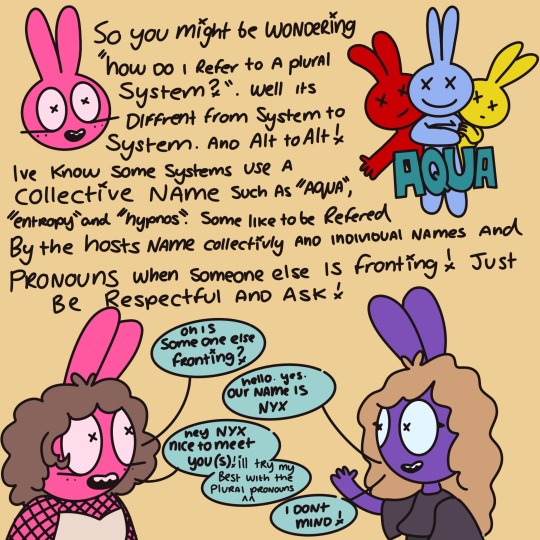


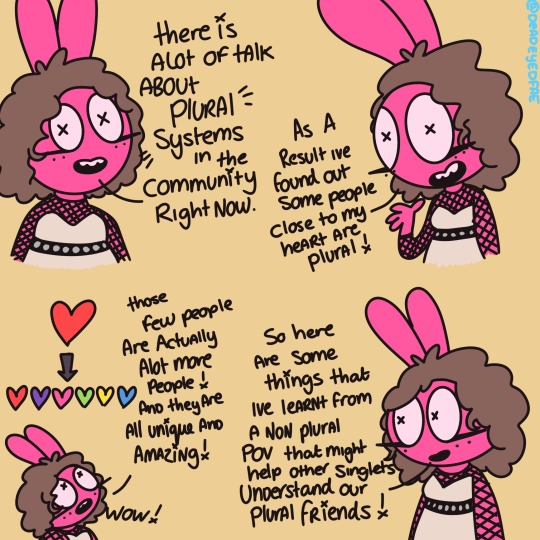

I had some help on this one from @welldrawnfish and @ralathehuntress
This whole comic came from someone in our community that im very close with but im not sure if they have officially stated they are Plural here so ill not tag them, needless to say if it wasn't for them and thier amaizng headmates i couldn't have made this comic, thier experiences have helped me understand a whole other type of experience in a way that im sure i wouldn't have been able to understand without them!
❤️💜💖💚💙💛
#plural system#plurality#Plural art#Singlet#transgender#queer artist#lgbtq#transfem#artists of tumblr#small artist#furry#furry oc#lgbtqia artist#My plural friends are fantastic and I'll do my best to support them anyway i can
1K notes
·
View notes
Text
Hi y'all, Cynthia here! Gonna throw out a small cry for help and bother y'all.
We're kinda really struggling right now to make ends meet. Between being unsure about making rent and needing funds to be able to get to our appointment in Austin, we could really use the extra help.
I know Lari's been streaming a whole lot lately, that's to help make up the difference with the hours at work we're losing at the moment. But things are kind of dire.
Our Ko-Fi is open, even if we don't have much to offer art wise. A little help will go a long way right now.
https://ko-fi.com/lariumbreon
#trans#transgender#trans artist#lari's thoughts#ko fi support#plurality#plural posting#support#Cynthia#Cyn Posting
505 notes
·
View notes
Text
Your symptoms don’t have to perfectly match the stereotypical view of the disorder.
No, you don’t have to have extremely distinctive alters or switch 24/7 to have DID/OSDD/PDID.
No, you don’t have to feel empty and sad 24/7 to be considered to have depression.
No, you don’t have to be super clean, tidy, and “perfectionistic” to have OCD.
No, you don’t have to be hyperactive externally to match an ADHD diagnosis (there’s inattentive, quiet types too)
Most of all disorders live on a spectrum, and within that spectrum are several smaller spectrums for each symptom. Everyone poses their symptoms differently, and every experience is very unique. The overall “umbrella” of a disorder is just for: 1) insurance diagnostic reasons and 2) to better relate someone’s experience to a broader experience.
The experience and symptoms you have matter a lot more than the label.
#did#osdd#pdid#ocd#cdd#autism#adhd#mdd#clinical depression#mental illness#mental health#mental disorders#pdid community#osdd community#system community#plural community#cdd community#autism community#adhd community#system things#system stuff#system#plural#positivity#support#traumagenic did#osdd system#pluralgang#did community#actually did
199 notes
·
View notes
Text
Hot take maybe, but “singlets shouldn’t have opinions on/be speaking on syscourse” is bullshit no matter which side it’s coming from.
You can’t really not have an opinion on whether a group of people is allowed to exist, especially if you’re interacting with people who are a part of that group at all. It’s a little like saying “cis people shouldn’t have an opinion on whether nonbinary genders are real” - yes they should??? And in fact they kind of don’t have a choice but to have an opinion, especially if they know even one (1) nonbinary person.
I get where this comes from - it’s an example of a thing the internet at large has done, where we’ve taken “people not part of X Group shouldn’t speak over people who are X when it comes to issues affecting X”, a reasonable and true statement, and turned it into “if you’re not part of X Group you can’t have an opinion at all about issues affecting X,” a statement that sometimes seems reasonable at first glance but usually falls apart the second you dig into it. And when it comes to syscourse, it really falls apart, because according to one side, the other side aren’t really systems anyway, so if you believe singlets shouldn’t speak on syscourse, then the words of endogenic systems are automatically void! Very convenient to be able to completely invalidate your opponent’s argument before they’ve even opened their mouth, purely based on the demographic you perceive them to be a part of.
(Which is, of course, often the point - “don’t involve yourself in syscourse” is often a thinly veiled “shut up and let me bully people in peace”, especially when shouted at someone who was involved in syscourse against their will. “Don’t involve yourself in syscourse” doesn’t work if, for example, the person “involving themself” is the admin of a server where people are arguing about whether the endogenic systems in the server should be allowed to call themselves that - they have no choice but to make a decision on how to moderate that situation, and “not involving themself” is just letting the sysmeds win by default. It’s the paradox of tolerance.)
#plurality#I’ve mostly seen this from sysmeds in the past but recently I’ve seen it from a couple of endo supporters as well#and I’m just. folks we gotta stop. this ain’t it. this is helping no one#endo safe#syscourse#I guess#rani talks
138 notes
·
View notes
Text







An Introduction to Plurality (1/2)
(text: Hi everyone! Quinn here. This comic is going to be the first in a series about plurality, which is a fascinating and extremely misunderstood topic, and one very close to me. So, without further ado... Title text: "What is Plurality?" Plurality is the phenomenon where multiple self-aware entities are housed in one person's brain. It is often conflated or grouped with schizophrenia, but the two are unrelated. This is very important! If someone is plural, it does not imply that they are schizophrenic whatsoever! Not that there's anything wrong with being schizophrenic, though! A person who's plural is called a system, or collective. They often use the pronouns we/they, but of course anyone can have any pronouns, so ask them if you don't already know theirs. You can think of a plural system like a group of roommates. Except instead of an apartment, they have a body. [Panel shows woman with a house inside her. One person is sleeping in a bed, the other reading a book.] Individual members of a system, or headmates, can often communicate with each other by thinking, like an internal telepathy. Others may write letters to their headmates, or make voice recordings. It's simply a matter of what works best for them. They can also take turns being in front -- that is to say, being in control of the main body. This is why a plural individual can seem to "switch personalities" at certain times and seem like a different person. They objectively ARE a different person. In fact, it can be problematic if you DON'T treat your own headmates like real people. [Panel shows headmate crouched, thinking "Am I even real?] They can struggle with emotional issues just like anyone else! If they are denied from expressing themselves, they can exhibit anxiety and depression, which will be felt among the whole system! [Panel shows the host's hand reaching down to the headmate and saying "Yes you are."] Therapy for systems often involves the host talking to their headmates, taking them seriously, and allowing them to have time in front so they can learn about themselves.)
#art#comics#pen and paper#plurality#multiplicity#headmates#alters#system communication#system pride#system education#fronting#plural experiences#life as a system#comic#mental health comic#self care#support#plural system
169 notes
·
View notes
Text
Feel free to join us!
Anybody know we have an endo-safe discord server? It's specifically an adult-bodied space. It's open to systems of ALL types. No hate allowed, explicity. Featuring:
channels for nsfw, substance and other mature subjects
support areas
various general chats
plurality-specific channels
voice chat
several tailored roles
bots (including tupperbox, pluralkit, pokétwo, probot, autorole and more)
We're also coming out with a bodily 16+ server for those that may feel excluded. :3
DM us, interact with this post, or friend us on discord (bly_guy) for more details! Keep in mind: we're currently transitioning from manual to auto roles, so patience will be necessary! 😅
Links:
Plenty Plural Positive Server (18+)
Pluraltopia Server (16+)
#plural discord#system discord server#endo positive#endogenic positivity#headmate help#system help#plural help#system advice#discord server#pluralgang#pluralpunk#power to the plurals#endo friendly#endogenic safe space#endo pride#didosdd#mixed origin#endogenic#neurodivergent#neurodivergent pride#system pride#anti endos dni#sysmeds dni#system discord#system support#plural support#did#osdd#endogenic safe#endogenic friendly
15 notes
·
View notes
Text
Supporting endogenics will always be more important than humiliating anti endos. -Ange
#Angie’s hot takes#ok to rb#endo safe#pluralgang#plural gang#pro endo#endo friendly#inclusive plurality#actually plural#plural community#pro endogenic#endogenic friendly#endogenic support#endogenic safe#just because it’s easy doesn’t mean it’s always necessary
274 notes
·
View notes
Text
If anyone is willing and able to spare a few dollars, we're fundraising to buy the lifetime membership for Coughdrop AAC (one-time purchase of 295 $USD)
We're currently an unemployed student whose disabilities make it difficult to earn much income -> currently, most of our funds go towards medication, appointments, and food
We plan to host a livestream "donathon" in which we'll draw a little doodle for every person who donates during the livestream, but we don't know exactly when that'll be...
Please don't feel pressured to donate if you're not in a place to safely do so! Times are tough, and there's nothing wrong with prioritizing your health and well-being <3
If you can though, our Ko-fi is
#aac#aac user#aac app#high tech aac#coughdrop#coughdrop aac#fundraiser#fundraising#plural system#queer system#disabled system#plural#queer#disabled#mutual aid#accessibility#disability accommodations#disability accessibility#psychotic system#psychotic#autistic system#autistic#selective mutism#speech loss episodes#semi speaking system#kofi#kofi support#ko fi#ko fi support#thecouncil aac
61 notes
·
View notes
Text
Casual reminder that the ToSD is supported by brain scan studies
Dissociative part-dependent biopsychosocial reactions to backward masked angry and neutral faces: An fMRI study of dissociative identity disorder.
Functional Neuroimaging in Dissociative Disorders: A Systematic Review
Dissociative Part-Dependent Resting-State Activity in Dissociative Identity Disorder: A Controlled fMRI Perfusion Study
Dissociative identity state-dependent working memory in dissociative identity disorder: a controlled functional magnetic resonance imaging study
Neurobiology and Treatment of Traumatic Dissociation
I'll probably keep adding more to the comments for my own records
#syscourse#plural#endo safe#plurality#not syscourse#sysconversation#pro syscourse conversation#did#osdd#osddid#cdd system#cdds first#tosd#research#debunk#a theory about traumatic dissociation has no bearing on the validity of endogenic systems#they can overlap but they are distinctly unrelated concepts#you only hurt cdd systems when you deny well supported trauma theories#reblog to save a cdd system
57 notes
·
View notes
Text
"This ___ is anti-Trump"









We hate him with all our being. Sorry for the sudden political jumpscare. But being an American is scary rn.



#corporateuserboxes#userbox#userboxes#sysbox#system userbox#system userboxes#userbox blog#plural userboxes#plural userbox#alter userbox#headmate userbox#part userbox#shard userbox#system member userbox#anti trump#fuck trump#not my president#trump supporters dni#fuck trump and his supporters stay far far away from us at all costs
53 notes
·
View notes
Text
Unmasking 101
This is our own post covering unmasking as a system, something that we have been able to accomplish to an extent that we are quite comfortable with. We hope that it will prove useful to some of y’all!
Disclaimer: we are one system with DID, and we can only provide our own perspective at this time. What has worked for us may or may not work for you, so use your best discretion when following the advice listed here!
What is masking?
Masking is the concept of hiding, disguising, and/or suppressing neurodiversity in an attempt to appear neurotypical. Neurodiverse people may mask for a wide variety of reasons, including to help keep themselves safe, to fit in and make friends, to avoid drawing unwanted attention, to be taken seriously by others, and more. While masking most often refers specifically to autistic experience, anyone with any sort of neurodiversity can mask.
Masking vs. Covertness
Quite often, complex dissociative disorders like DID are covert, meaning their symptoms may not be easily noticed or recognized by outsiders. Having covert symptoms is not the same as masking! It is possible to live a happy, healthy life with a covert disorder, without ever needing to “unmask” or trying to make your symptoms more noticeable.
What’s most important is learning how to live an authentic life that helps you and your system feel safe, comfortable, and happy as you are! In fact, attempting to unmask when in actuality your disorder is just covert, this could have negative, harmful, or otherwise adverse affects on your system. It’s never good to try and force yourself or your headmates to be something you’re not, and this goes for systems with covert symptoms and presentations!
What does masking look like?
In systems, masking can look like:
- other headmates acting like the host when they front
- the whole system adopting similar mannerisms in order to appear as a singlet
- acting like memories, events, and things around you are cohesive and make sense to you when they really aren’t
- pretending to recognize others or recall information that you simply cannot remember
- attempting to quell or silence internal communication and dialogues between other system members
- consciously or unconsciously ignoring signs or plurality in your own life
- copying or mirroring the actions and behaviors of the singlets you meet and interact with
And so much more! Every system is different, so masking can look very different from system to system.
How can we unmask?
Unmasking is a process that may take lots of time, patience, and effort to achieve. But it most certainly can be done! Here are a few steps you may take while undergoing this transition from masking to unmasking:
1) Recognize when you are masking.
Try to notice when you or your system members are attempting to hide, disguise, or otherwise conceal your plurality. What actions do you take to mask? What situations do you find it easier or more difficult to mask? Do certain headmates tend to mask more than others? Do you tend to mask more around certain people and places?
At this stage there’s no need to try and stop masking immediately. Just try to take it slowly and start noticing masking behaviors as they arise. If you have a system journal or some other place where you all keep thoughts organized, perhaps make a list of the masking behaviors you all are noticing in your system. Recognizing behaviors is a solid first step towards changing them!
2) Understand why you are masking.
Quite often systems mask as a self-defense mechanism. Are you in a safe environment? Do you still live, work, or associate with abusers or others who would not understand your plurality? Who benefits from your system masking? Who is harmed? Is masking easy and second-nature for your system, or is it difficult and exhausting? These sorts of questions can help answer whether or not it will be safe to mask, and whether or not you actually are masking or just have a covert/less noticeable presentation for your system.
3) Have internal conversations.
To better understand yourself, your system, why you mask, and when you mask, internal communication is key. You may have headmates who are purposefully masking in order to protect themselves and your whole system. You may have in-system roles and functions that are specifically dedicated to masking. You may have headmates who were masking without even being aware that they were doing so. Having lots of safe, open, and welcoming discussions with your headmates can help you better understand masking in your own system, and how best to formulate a plan to unmask in your daily life.
You may ultimately come to the conclusion that masking is what’s best for your system at this time, and that’s okay! Please prioritize your own health and safety over your desire to be your authentic selves. Sometimes it just isn’t safe to attempt unmasking. You know yourself, your system, and your situation best, so try to work together with your headmates to come up with a plan that works well for everyone!
4) Encourage internal and external authenticity.
Once you have a good idea of when, why, and how your system masks, you can start taking steps to change these actions and behaviors (granted, that you are in a safe place to do so!). In our experience, this can be achieved by encouraging headmates to branch off in their own ways as they have the desire to do so. Creating a safe space inside where headmates can feel secure in exploring their identities is crucial for unmasking!
It may happen slowly, but it starts by encouraging small actions and desires that headmates have which differ from each other. A headmate wants to use a specific tonal inflection that’s different from fellow members? Go for it! A headmate wants to engage in an activity that is uncharacteristic for their system as a whole? As long as it’s safe, do it! Creating an internal environment of acceptance and then encouraging each other to embrace small moments of authenticity can help chip away at that mask.
5) (if possible) Build an outside safe space.
If your system has another person in your life who knows about your plurality and is willing to accept you all unconditionally, this can be incredibly healing and work wonderfully to help unmask. Just existing around our therapist and our partner system have helped us to embrace our individuality and accept our unique features when fronting. If there is a loved one in your life who knows about your system, maybe try explaining the concept of masking to them, and ask them to help support you through this unmasking process.
If there is no one in your life who you can safely unmask around, you can still try to practice unmasking by doing so when you are alone. But please, try to center your system’s safety as you go about this process! Don’t attempt to unmask if masking is what’s keeping your system safe, healthy, and alive.
6) Don’t compare yourselves to others.
It may be tempting to compare how your system functions to others. Some systems might have never had to mask. Some might find unmasking to be a quick and easy process. Just because it may be difficult for you doesn’t mean that it’s impossible! Please try to avoid comparing yourselves to other systems, and even other headmates in your own system. Some headmates may be able to unmask more easily than others, and that’s okay! Respect each headmate’s individual needs and abilities, and go at your own pace.
What if we go back to masking after unmasking for a while?
This is only natural! After habits have been built up and practiced for so long, it can be difficult to change them in a permanent way. Masking after unmasking for a while is nothing to be ashamed of, and doesn’t mean your system has lost any progress! Many systems may find that their unmasking process happens in waves or cycles, with each cycle of unmasking followed by a masking period. The more and longer you’re able to unmask, the shorter your next masking cycle may be!
Don’t give up! If you find that your system has reverted to old ways, simply start at the beginning, show yourselves patience and understanding, and start recognizing when you mask once again.
In Conclusion
A TLDR might be: masking, or hiding/concealing neurodivergent traits, is common in neurodivergent people. Masking is not the same as having covert symptoms, so please try and understand the differences before attempting to unmask. Masking can look incredibly different and have a wide range of presentations. By learning about yourself, understanding when, why, and how you mask, having internal conversations about masking, encouraging authenticity, building internal and external safe spaces, and having patience with yourselves, you can start trying to unmask. Having a safe person to be open with about your plurality may help with this process, and avoiding comparing yourselves to others can help too! If you regress, backslide, or go back to masking after a while, that does not invalidate your progress - keep going and don’t give up! In all of this, center your system’s safety and security, and don’t attempt to unmask if it could be dangerous for your system.
We’re sorry this got so long (this is actually a very complex topic!) but we hope this helps! If anyone has any further questions regarding masking or unmasking as a system, don’t hesitate to reach out. And of course, we are just one system providing our perspective, so don’t be alarmed if what we’ve said here isn’t all that applicable to your system.
If you’ve made it this far, thank you so much for taking the time to read! We’re wishing you and your system the very best of luck in your unmasking endeavors. Take care, and have a wonderful day!

#plurality#pluralgang#multiplicity#actuallyplural#masking#unmasking#masking plurality#unmasking plurality#dissociative identity disorder#did osdd#complex dissociative disorder#system support#long post
121 notes
·
View notes